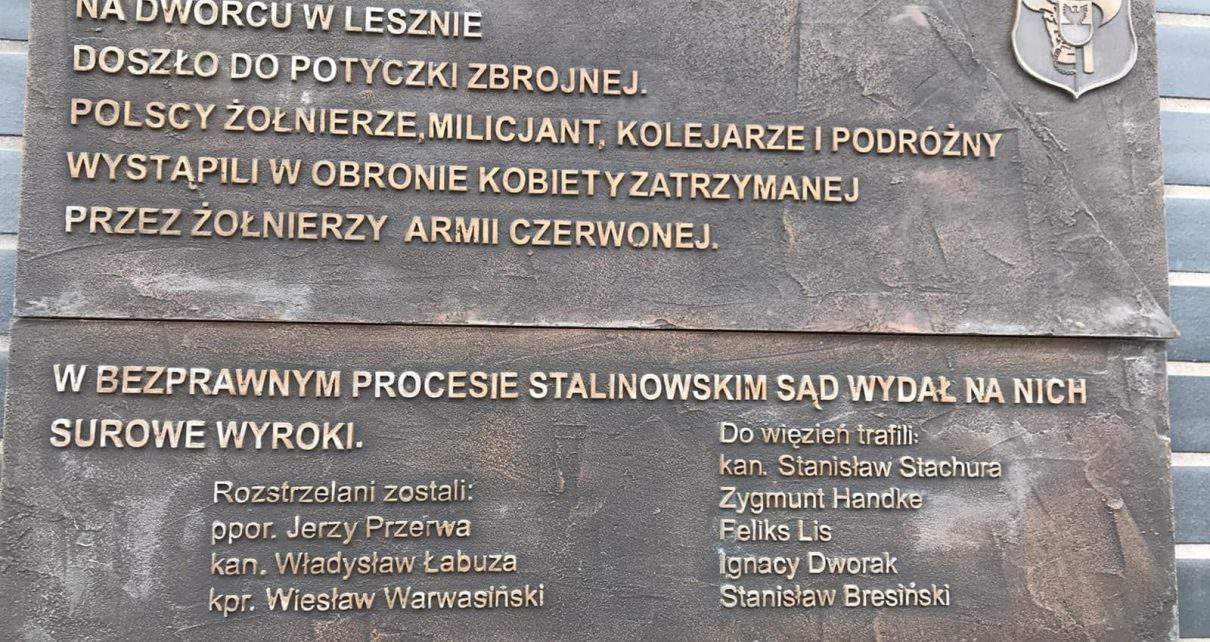Although 75 years have passed since the end of fighting in Europe this year, many followers of the Soviet narration of rescuing Poland by Soviets omit information on crimes commited by the Red Army during „liberation” and afterwards. About true reality of this period , despite that we have a great deal of reminiscences, due to odd coincidence it is being said so little in the public space. And these events are frequently spine-chilling. One of such events was saved on the slab at the railway station in Leszno (Great Poland voivodship). It is linked to the story , which happened in 1947. At the time at night between 27 and 28 of May on the Poznań – Leszno route the tailor Feliks Lis travelling there was secretely informed by the lady (Zofia Rojuk) who travelled with the Soviet soldiers that she had been sold by her husband for a bottle of vodka together with her child. The Soviet troopers left the child at the railway station.
Initially the train crew tried to convince the Soviets to free the woman, and when negotiations failed , the Leszno railway station staff was notified. At the beginning after the train got Leszno the policeman Zygmunt Handke tried to intervent. However the Soviets threatened him with weapons.
The policeman didn’t retreat and called the military platoon from Leszno as support. After the troop reached the place an exchange of words happened in which Second Lieutenant Jerzy Przerwa (1925 – 1947) was involved who was the commander of the Polish unit. The Polish commander ordered his subordinates not to allow the Soviets to leave the railway station. Personally he tried to check credibility of the Soviet commander’s words who claimed that the woman had been detained acoording to the law. However the Soviet commander refused to show the documents. Probably during the commanders talk the Soviet soldiers attempted to quit the railway station. The Poles commiting their commander’s order decided to stop them. The Soviets who felt in Poland unpunished reached the weapons. The gunfight occured and as the result two of the Red Army officers and a private were shot dead.
At this point it is worth to stop to introduce the figure of the heroic Polish commander. According to the researcher of this case Krzysztof M. Kazmierczak, he was supposed to be born on April 23 of 1925 in Różyszcze town in the Volhynia region [1]. During the war as his wife was writing in the letter to ask the Marshall Michał Rola- Żymierski for intervention , he was supposed to cross the whole military route of the Polish Army which was founded on the East. He got wounded and later received a badge for soldier’s attitude [2].
„Głos Wielkopolski” , faking the events wrote :
(…) On May 26 this year the Soviet authorities in agreement with Polish ones arrested in Koszalin a Soviet citizen named Rojuk. While convoying her from Koszalin to Legnica, she managed to communicate with the random traveller Mr. Lis, misleading him by telling a fantastic story concerning alleged „kidnapping” of her by the Soviet soldiers. To cause bigger impression Rojuk introduced herself as a Pole. Feliks Lis alarmed the train staff , which in turn sent a message to Leszno station. Staying by accident at the railway station the commander of the Polish military regiment based in Leszno identified the convoy of the arrested person, and recognizing the groundlessness of the circulating rumours, calmed down the gathered folks. The matter would have been finally settled if it had not been for the intervention of the Police Corporal Zygmunt Handke, who sent to the headquaters of the Polish Army in the city an alarming message on the reigning situation at the railway station. The city commander Second Lieutenant Przerwa demanded from an officer of the inspection regiment of the alarm unit, moreover, going to the railway station , introduced the troopers to the purpose of the expedition, this way, that they were convinced on neccesity to intercept the kidnapped woman. Possibility of using weapons was discussed as well (…) Second Lieutenant Przerwa (…) ordered to release nobody among those present. Two of the Soviet officers wanted to leave the waiting room. In effect one of the Polish soldiers shot in direction to the Soviet military personnel, what was the trigger to start fireing to the remaining in the waiting room the Soviet servicemen[3].
The Polish soldiers’ trial took place on June 7 of 1947. On the top of the court which issued the
disgraceful verdict Lieutenant Colonel Franciszek Szeliński was placed (of Jewish origin, never was punished because of his attitude regarding Poles) 4], and the idictment was signed by Major Maksymilian Lifsches (in Poland he received Lityński surname; he was also of Jewish origin, after fights for power in the communist apparatus in 1968 safetely left with his family to Sweden ) [5]. However as determined reasearching this case journalist Krzysztof M. Kazmierczak , real investigation was conducted by the Soviet officer in the Polish uniform Wilhelm Swiątkowski. The prosecutor Swiątkowski afterwards returned to the Sowiet Union – his fate is unknown [6].
The issued verdicts sentenced to death the Polish commander and three of his soldiers (Second Lietutenant Jerzy Przerwa, Canoneer Władysław Łabuza, Corporal Wiesław Warwasiński and Cannoneer Stanisław Stachura), two persons were sentenced to 10 years of prison (Cannoneer Tadeusz Nowicki and the policeman Zygmunt Handke), Feliks Lis who notified the railwaymen about the issue was sentenced to 12 years of prison. While isolated trial the Railway Security Guard representatives: Ignacy Dworak and Stanisław Bresiński who were involved in the intervention got prison sentence as well. The convicts wrote a letter to Bolesław Bierut who took advantage of the law of grace only in relation to Stanisław Stachura , converting his death sentence to 15 years in prison and regarding Tadeusz Nowicki (releasing him from the penalty). The remaining convicts were shot dead on June 15 of 1947 [7].
Zofia Rojuk herself, as she wrote after years in the letter to her daughter, after events in Leszno was deported deep into the USSR. Only years later she was allowed to move to the territories of Ukraine, where she worked as a teacher. She was banned to leave the Soviet Union.
Above example shows, that the Soviet soldiers and high ranked military personnel treated Poland not as an allied country, but as a conquered colony, which occupation cost them some number of deaths of their brothers in arms during the fights with the Germans. Poland after 1945 was by no means sovereign.Women were under threat due to possible rapes from so called „liberators”, Soviets by themselves took away Polish movable property, the Polish Underground soldiers fighting initially against the Germans were considered as enemies, for whom the only reward after years of fighting against German nazism was a cold grave and shot through scull which ended the torture in the NKVD and the security apparatus dungeons. Nevertheless, the Polish society doesn’t know these stories, and its representatives give thanks at the Red Army monuments.
Tłum. Marcin Petela
[Wróć do tekstu w języku polskim]
Podoba Ci się to co robimy? Wesprzyj projekt Magna Polonia!





